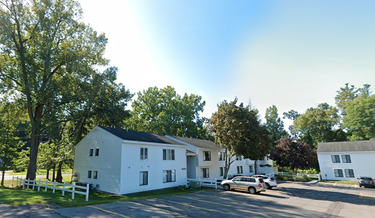More than 100 families who live or work in Guilderland are waiting for subsidized rent
GUILDERLAND — Guilderland has 200 families on a waiting list for government-subsidized housing but has only 95 slots.
That number of Housing Choice Vouchers was set by a study in 1982, according to James Mastrianni whose business oversees the federal program for the town.
The study, Mastrianni told the town board at its Tuesday meeting, was done by his father and predecessor, Joseph E. Mastrianni, for whom the business — JEM Inc. — is named.
“The next person we’re going to reach on the waiting list applied in 2019,” said Mastrianni.
Supervisor Peter Barber asked why, with such a long waiting list, more spots aren’t available. He said it “just seems strange” to be locked into something established more than 40 years ago.
“We’re frozen in time,” said Barber.
“HUD hasn’t made it available,” said Mastrianni of the Department of Housing and Urban Development. He also said, “There’s a lot of demand for this program.”
One of the initial priorities of the Biden administration, Mastrianni said, was to increase the Housing Choice Voucher program. “But that’s stalled now,” he said.
President Joe Biden’s budget proposal for 2023 had called for $32 billion for the Housing Choice Voucher program, which would have added 200,000 households and been the largest one-year increase in vouchers since the program started in 1974.
On March 9, the White House posted Biden’s current plan for expanding access for affordable rent, which says, “While around 2.3 million low-income households receive rental assistance through the Housing Choice Voucher (HCV) program, another roughly 10 million are eligible and do not receive assistance due to funding limitations and wait lists.
“The Administration has secured rental assistance for an additional 100,000 households through the American Rescue Plan and the 2022 and 2023 appropriations bills.”
Biden’s budget includes a voucher guarantee for two population groups that the White House says “are acutely vulnerable to homelessness: youth aging out of foster care and extremely low-income veterans.” Between discretionary funding and program reserves, these vouchers — if approved by Congress — would serve over an additional 200,000 households.
Councilwoman Amanda Beedle noted that, of the 91 families in Guilderland currently receiving the housing assistance, 86 of them are for elderly or disabled residents.
“So we’re not even helping potentially 100 people here in town,” she said, since Mastrianna had reported 102 families have been given first preference on the waiting list for living or working within the community.
“Is there some way we can appeal on behalf of Guilderland to have that number increased?” asked Beedle.
“So these people, they qualify for the assistance, but there just isn’t the funding,” said Councilwoman Christine Napierski.
“If there really was an option here, we would be looking at it,” said Mastrianni. “There just is not an option to increase this.” He added, “You’re not alone in this boat.”
In introducing himself to the board, Mastrianni said that his business — founded in 1975, which he purchased about 18 years ago, and which has a staff of 36 — administers 4,000 units of Housing Choice Vouchers in 15 counties across upstate New York.
The goal, he said, of HUD Section 8 housing is “to provide safe, sanitary, and decent housing for the elderly, the disabled, and the low-income members … of your community.”
Councilman Jacob Crawford asked what the options are for families on the waiting list.
“They’re either living with families or they’re, you know, living in a severely rent-burdened situation,” said Mastrianni.
Barber, in his State of the Town address in February, had said the most important initiative coming up is updating the town’s comprehensive plan, which was first adopted in 2001. He noted that Governor Kathy Hochul in her State of the State address had emphasized housing growth.
“I think it’s a testament that we want to make sure our town is home to all residents, regardless of income,” said Barber in his February speech. “It should not make a difference whether you’re a doctor or a lawyer, we want to make sure the home-care aids, the laborers, the people who do not have the same income have a welcome home in our town.”
At Tuesday’s meeting, Barber said he wanted to make sure that the Comprehensive Plan Update Committee was aware of the situation with the long waiting list and lack of vouchers. Although the committee wouldn’t have control over adding more vouchers, Barber acknowledged, it could “look at other tools to provide affordable housing.”
Towards the end of 2024, the town will have a public hearing on the next five-year action plan for the HUD program.
How vouchers work
Under the Housing Choice Voucher program, a subsidy is paid directly to a landlord based on the income of each family in the program. A family typically pays 30 percent of its adjusted gross income.
The program, Mastrianni said, allows elderly and disabled people to live near their families and near the services they require.
It means a “working poor family” can move closer to where there are jobs compatible with their skills, he said.
He also said of Guilderland, “Here, in this community, … a lot of times families will use it to move to areas that have very good school districts.”
An inspection of the Section 8 housing is typically performed each year, Mastrianni said, to be sure it meets standards that can be different than town codes.
“Most landlords are interested in participation,” he said, “because, even though there’s some additional administrative burden, and we do have the inspection that has to be done, this is typically a good deal for the landlord because we provide guaranteed rent.”
He added, “During the pandemic, we never stopped making payments.”
In the Capital District, Mastrianni said, the fair-market rent for a two-bedroom apartment is $1,313.
“We build a payment standard off of that,” he said. HUD allows 10-percent above or 10-percent below that average.
“Given the rate of inflation, given the intense effects of the pandemic, we are at 10-percent above the fair-market rent. So, quick math, 1,400 bucks,” Mastrianni said.
The average subsidy in Guilderland is $653 per month, he said, meaning the average gross monthly income of a participant is just under $1,600.
Family Self-Sufficiency
Guilderland currently has nine participants in an add-on program meant to foster family self-sufficiency.
Nancie Williams, who works for Mastrianni’s company, explained to the board that the Family Self-Sufficiency program is “to remove a disincentive for families who are working and have earned income to do well.”
Williams said that doing well can lead to a loss of benefits that is “devastating to the family.”
She gave the example of a family where the wage-earner was given a raise of 25 cents per hour. “She lost her child-care subsidy of over $600 a month,” said Williams.
So what the Family Self-Sufficiency program does is create an escrow account for the family to pay into as income increases to accomplish goals such as getting education, transportation, childcare, or a home.
The homeownership program allows a family to save to qualify for a mortgage using both the funds that they’ve accumulated in their own savings and in their escrow account. “And we can help subsidize that home for a period of time for those families,” said Williams.
She also said, “We’re really the arm of the program that works with your disabled and elderly participants in the program to make sure that they have services in place to keep them as independent for as long as possible.
“And then, with your working families, to make sure that, as they increase their opportunities, that those opportunities are stable, and to help them to kind of move into an asset-building model that allows them to decrease their dependence on subsidies.”



